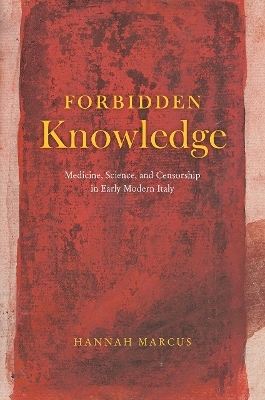
Forbidden Knowledge
Medicine, Science, and Censorship in Early Modern Italy
Seiten
2023
University of Chicago Press (Verlag)
978-0-226-82947-0 (ISBN)
University of Chicago Press (Verlag)
978-0-226-82947-0 (ISBN)
An exploration of the censorship of medical books from their proliferation in print through the prohibitions placed on them during the Counter-Reformation.
Forbidden Knowledge explores the censorship of medical books from their proliferation in print through the prohibitions placed on them during the Counter-Reformation. How and why did books banned in Italy in the sixteenth century end up back on library shelves in the seventeenth? Historian Hannah Marcus uncovers how early modern physicians evaluated the utility of banned books and facilitated their continued circulation in conversation with Catholic authorities.
Through extensive archival research, Marcus highlights how talk of scientific utility, once thought to have begun during the Scientific Revolution, in fact, began earlier, emerging from ecclesiastical censorship and the desire to continue to use banned medical books. What’s more, this censorship in medicine, which preceded the Copernican debate in astronomy by sixty years, has had a lasting impact on how we talk about new and controversial developments in scientific knowledge. Beautiful illustrations accompany this masterful, timely book about the interplay between efforts at intellectual control and the utility of knowledge.
Forbidden Knowledge explores the censorship of medical books from their proliferation in print through the prohibitions placed on them during the Counter-Reformation. How and why did books banned in Italy in the sixteenth century end up back on library shelves in the seventeenth? Historian Hannah Marcus uncovers how early modern physicians evaluated the utility of banned books and facilitated their continued circulation in conversation with Catholic authorities.
Through extensive archival research, Marcus highlights how talk of scientific utility, once thought to have begun during the Scientific Revolution, in fact, began earlier, emerging from ecclesiastical censorship and the desire to continue to use banned medical books. What’s more, this censorship in medicine, which preceded the Copernican debate in astronomy by sixty years, has had a lasting impact on how we talk about new and controversial developments in scientific knowledge. Beautiful illustrations accompany this masterful, timely book about the interplay between efforts at intellectual control and the utility of knowledge.
Hannah Marcus is the John and Ruth Hazel Associate Professor of the Social Sciences in the Department of the History of Science at Harvard University.
Introduction: The Paradox of Censorship
1. The Medical Republic of Letters and the Roman Indexes of Prohibited Books
2. Locating Expertise, Soliciting Expurgations
3. The Censor at Work
4. Censoring Medicine in Rome’s Index Expurgatorius of 1607
5. Prohibited Medical Books and Licensed Readers
6. Creating Censored Objects
7. Prohibited Books in Universal Libraries
Epilogue
Acknowledgments
Appendix
Notes
Bibliography
Index
| Erscheinungsdatum | 16.09.2023 |
|---|---|
| Zusatzinfo | 40 halftones, 2 tables |
| Sprache | englisch |
| Maße | 152 x 229 mm |
| Gewicht | 513 g |
| Themenwelt | Studium ► Querschnittsbereiche ► Geschichte / Ethik der Medizin |
| Naturwissenschaften | |
| Sozialwissenschaften ► Soziologie | |
| ISBN-10 | 0-226-82947-2 / 0226829472 |
| ISBN-13 | 978-0-226-82947-0 / 9780226829470 |
| Zustand | Neuware |
| Informationen gemäß Produktsicherheitsverordnung (GPSR) | |
| Haben Sie eine Frage zum Produkt? |
Mehr entdecken
aus dem Bereich
aus dem Bereich
Die Geschichte eines Weltzentrums der Medizin von 1710 bis zur …
Buch | Softcover (2021)
Lehmanns Media (Verlag)
17,95 €
von der Antike bis zur Gegenwart
Buch | Softcover (2024)
C.H.Beck (Verlag)
12,00 €
Krankheitslehren, Irrwege, Behandlungsformen
Buch | Softcover (2024)
C.H.Beck (Verlag)
39,95 €


